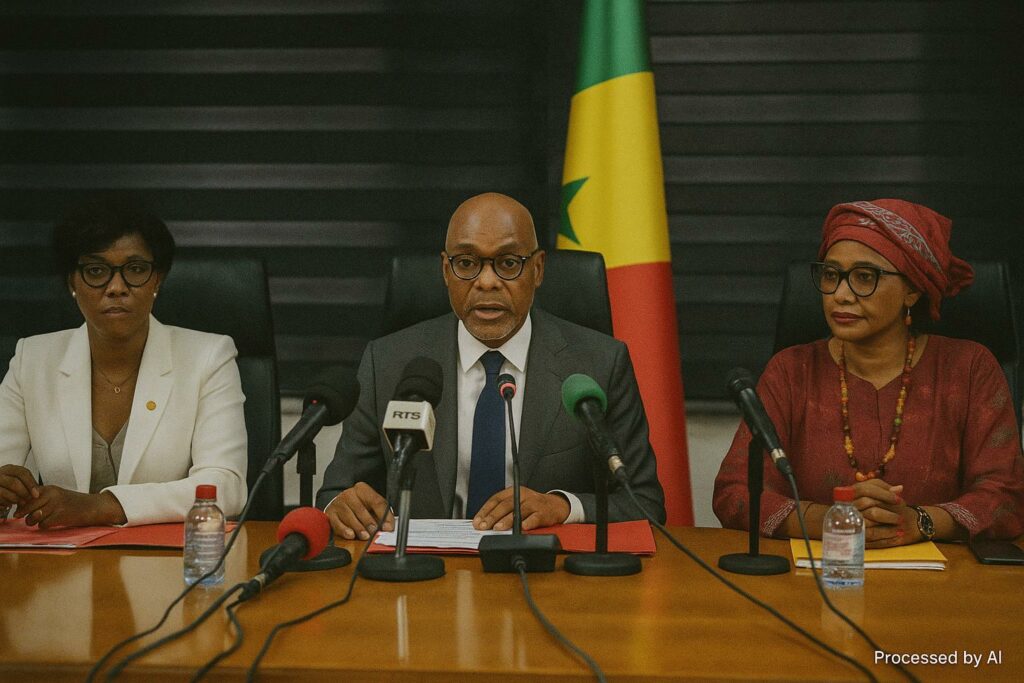Contextualising Congo’s Extractive Ledger
The Republic of the Congo occupies a paradoxical space in global commodity flows. Hydrocarbons and minerals account for roughly two-thirds of public income, yet the volatility of prices and the opacity historically surrounding contracts have often distorted budgetary planning. Since re-adhesion to the Extractive Industries Transparency Initiative in 2012, Brazzaville has sought to align fiscal disclosures with international norms. The 24 July session of the national EITI committee therefore arrived at a pivotal juncture: oil production has rebounded to pre-pandemic levels while external lenders, including the IMF, increasingly tether concessional envelopes to demonstrable governance progress (IMF 2024).
Inside the National EITI Committee’s Deliberations
Presiding over the meeting, Finance Minister Christian Yoka set an almost forensic tone, insisting that every concession, royalty stream and social contribution be traceable in the forthcoming report covering fiscal year 2024. Flanked by Environment Minister Arlette Soudan-Nonault and Forestry Minister Rosalie Matondo, he argued that transparency has moved from being a rhetorical aspiration to a macro-economic necessity. Participants endorsed a timetable that should deliver a scoping study early next year, followed by an independent reconciliation of company payments and state receipts before December 2025.
Members also revisited an earlier commitment to publish production-sharing agreements in accessible language. Civil-society delegate Florent Michel Mokoko acknowledged the distance still to travel, conceding that several corrective measures flagged during the 2022 validation have yet to migrate from cabinet drafts to enacted decrees (EITI Congo 2023).
Data Integrity and the Challenge of Reconciliation
At the heart of the committee’s task lies the arduous reconciliation of multiple data reservoirs: Treasury ledgers, customs manifests, provincial tax receipts and company-reported transfers. Each source is maintained on separate digital platforms whose interoperability remains embryonic. A Norwegian-funded technical assistance programme is due to streamline metadata protocols, thereby reducing the margin of error that previously hovered around four percent of reported revenue (Norad 2023).
Officials candidly admit that the credibility of the 2025 report will depend on whether discrepancies are addressed in near real time rather than after publication. To that end, the Ministry of Finance is piloting an interface that allows auditors from the Supreme Audit Institution to query payment flows on a quarterly basis, a practice increasingly regarded as global best practice.
Aligning Fiscal Reforms with Climate Commitments
The extractive debate in Brazzaville no longer pivots solely on revenue optimisation. Congo’s vast peatlands store an estimated 30 gigatonnes of carbon, positioning the nation as a potential climate custodian. The government has therefore woven environmental metrics into its disclosure matrix, promising to attach greenhouse-gas baselines to each operating field. Minister Soudan-Nonault described the dual reporting as a ‘diplomatic dividend’, capable of unlocking climate finance without constraining legitimate development aspirations.
International observers, including the African Development Bank, have praised this approach, noting that blended finance schemes increasingly reward jurisdictions able to verify both fiscal receipts and carbon sinks (AfDB 2024).
Validation Countdown and Diplomatic Significance
Congo’s next validation before the EITI Board is scheduled for mid-2026, yet officials treat the July deliberations as the de facto starting gun. Failure would not only jeopardise concessional flows but also complicate Brazzaville’s role in ongoing debt-relief negotiations with Paris Club partners. Conversely, a successful validation could strengthen its bargaining position in forthcoming OPEC+ quota discussions, where production baselines frequently hinge on trusted data.
Western diplomats interviewed in the capital underline that the EITI process has become a bellwether of wider governance trends, informing risk assessments far beyond the oil basin. One European envoy put it succinctly: ‘If the numbers add up at the wellhead, they are more likely to add up in the budget.’
Prospects for Investors and International Partners
The private sector is watching attentively. French major TotalEnergies and Sino-Congolese joint ventures have both signalled willingness to deepen exploration provided fiscal rules remain predictable. The Ministry of Hydrocarbons has, in response, tabled a model production-sharing contract that caps cost-oil recovery and introduces an arbitration clause seated in Mauritius, a gesture aimed at reassuring diverse investor constituencies.
For multilateral actors, the forthcoming report will serve as a diagnostic instrument. The World Bank’s Development Policy Operation currently under preparation earmarks up to USD 200 million, contingent on measurable progress in revenue transparency (World Bank 2024). In this calculus, the July committee meeting is more than bureaucratic routine; it is an inflection point where regulatory diligence intertwines with geopolitical leverage.

